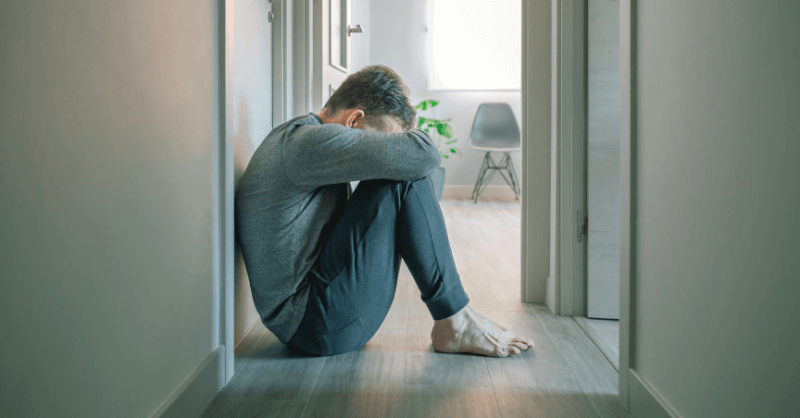Signs of Depression: Tips to Get Rid of Depression


![]() 29 minutes
29 minutes

960 Viewers
Depression is a severe and pervasive mood disorder. It is a common and serious medical illness that negatively affects how you feel, the way you think and how you act. Although the signs of depression are not fixed, it varies from person to person. Thus, knowing the signs of depression are essential to fight back against the disease.
The effect of depression can be mild or severe, depending on your ability to handle it. Depression causes feelings of sadness, hopelessness, helplessness, and worthlessness. It is also the reason for the loss of interest in activities you once enjoyed. The common symptom of depression is apathy, little appetite, difficulty sleeping, low self-esteem, and low-grade fatigue.
Depression can lead to a variety of emotional and physical problems. It is also responsible for decreasing your ability to function at work and home. Fortunately, depression is also treatable. If you know the symptoms of depression, you can find out you or others around you are depressed. Read this blog and know everything about depression.
Table of Contents
Depression in Men
Depression is a mood disorder, and the doctors may refer it to different names. They often call it clinical depression, major depression, or major depressive disorder. It affects our thoughts, feelings, body, and behaviour when we are suffering from it.
More than 300 million people are affected by clinical depression worldwide, and 16.8% of the UK’s male population are dealing with depression. So, it is safe to say that depression is also common in men.
For men, depression is a significant risk factor for suicide. Men are four times more in danger than women. Because men use gun and other dangerous methods when committing suicide.
Why male depression often goes undiagnosed?
Men with depression often aren’t diagnosed for several reasons. The reasons are:
Failure to recognise the signs of depression
Most men fail to recognise the signs of depression, especially at the beginning. For example, you may think that feeling sad or emotional is always the main symptom of depression. But it’s not always the same, everyone shows different signs.
For many men, feeling sad or emotional isn’t the primary symptom. For example, they feel headaches, digestive problems, tiredness, irritability or long-term pain when they suffer from depression. So, you need to identify the symptoms of depression to fight against it properly.
Downplaying signs and symptoms
At first, you may not recognise how much your signs affect you. Or, you may not want to admit to yourself or to anyone else that you’re depressed. They ignore, suppress or mask the symptoms of depression. This is an unhealthy behaviour, and this will only worsen the condition.
Reluctance to discuss depression symptoms
Men do not share their problems with friends and family but, it is always not the same. Sometimes they may be open to talking about their feelings with their close one, doctor or mental health professional.
If you are a man, like many men, you may have learned the art of how to emphasise self-control. You may think it’s not manly to express feelings and emotions associated with depression. Thus, you try to suppress them.
Resisting mental health treatment
Men often try to resist mental health treatment or taking help from others. Even if they suspect they are suffering from depression, most avoid diagnosis or refuse to accept treatment.
They avoid getting help from a doctor or family member because they are worried that the stigma of depression could:
Depression in Women
Women are more prone to the signs of depression. They are twice more likely to suffer from depression than men. If you are a woman, depression can impact every area of your life. For example, it can affect your physical health, social life, relationships, career, and sense of self-worth.
It can be caused by some factors such as social pressures, reproductive hormones, and your unique response to stress. Although, it’s essential to know that you are not alone. As mentioned above, women suffer two times more than men from depression, but it is treatable. You can do plenty of things to fight depression and make yourself feel better.
Signs and Symptoms of Depression in Men and Women
Common signs of depression in men and women?
Excessive Worrying
Constantly worrying about things could be a symptom of depression and anxiety. Well, some worry is a normal part of everyday life. But, worrying excessively about things that do not seem very important are the symptoms of depression. These worries are often invasive and affect your thoughts and feelings even when you try your best to ignore them.
Feeling Restless or On Edge
Unexplained restlessness and tension is another common symptom of depression. And it can include a sense of impending doom or disaster. Sometimes restlessness is accompanied by fear or even panic.
These feelings of restlessness can be concentrated on a specific event or can be more dispersed. For example, loss of a job or a natural disaster. If you feel like you are constantly waiting for the worst things to happen, you may be suffering from depression.
Muscle Tension
Are you constantly tense and physically wound up?
Muscle tensioning is a physical symptom that often accompanies mental health issues. This constant muscle tension can leave you feeling sore and physically tired, even when you haven’t done any form of physical activity. This prolonged muscle tension can often be the reason for chronic pain and other recurring illnesses. Thus, it’s important to nip it in the bud before it becomes more severe.
Feelings of Worthlessness
People who are suffering from depression, often feel a sense of incompetence and low self-esteem. It may be a more general feeling or may be related to a specific field such as work, school or personal relationships. We go through periods of self-doubt and uncertainty in our life, and it’s common to feel worthless. However, if you suffer from depression, the symptoms are more intense and tend to remain unchanged, regardless of external factors.
Excessive Guilt
Excessive guilt is similar to feelings of worthlessness. It is another common symptom of depression. When people suffer from depression, they feel guilty about things they have or haven’t done. They also often dwell on past actions to an unhealthy extent.
People can also feel guilty about their mental illness itself and the way it affects their lives. These feelings of guilt become more potent when the other common symptoms of depression compound it—for example, withdrawal from personal relationships and failure to fulfil responsibilities at work and school.
Excessive guilt of depression can be a vicious cycle for any people. So, it is very important to seek help before being caught in the spiral of excessive guilt depression.
Withdrawing from Family and Friends
People tend to withdraw from relationships with friends and family when suffering from depression. They also struggle to form new connections with others. When people suffer from depression, they can often feel like:
Lack of close relationships can also be another reason that leads people to depression. So, withdrawal from social interaction can worsen existing mental illness.
Reckless Behaviour
People do reckless things, including drug and alcohol abuse and unsafe sex, when they suffer from depression. This behaviour can also include risk-taking activities like reckless driving or getting into physical conflicts with others.
Reckless behaviours are often dangerous, and it is more common in men than women. It acts as a warning sign of mental health issues. If you find yourself drawn to reckless behaviours, you should seek help regardless of
Fatigue
Fatigue, lethargy, and constant tiredness is one of the most common symptoms of depression. If you find it challenging to get out of bed every morning or do anything other than the bare minimum, it can be a sign of depression.
These feelings of fatigue and tiredness can include both physical and emotional sensations. Fatigue can have a significant negative effect on your work and personal life. Chronic fatigue can often cause other medical problems. For example, it can cause autoimmune disorders and other issues. So, if you are suffering from fatigue, you should seek help from a professional.
Changes in Sleep Patterns
When people are in depression, their sleep patterns change significantly. It’s different for every person; some people sleep longer and some less than regular.
The first sleep-related sign is sleeping more than usual. This means you are getting much more sleep than you usually would. Another common sleep-related sign is sleeping less than normal. This means that you have trouble falling asleep or waking up earlier than usual.
If your sleeping pattern changes, then you will find it challenging to stay awake throughout the day. It’s pretty common to deal with disruptions in your sleep after a stressful or traumatic life event. But if these signs persist after a period, you may be dealing with a mental health problem.
It can also manifest as persistent difficulty in sleeping and even insomnia. The trouble with sleep can also have an extreme effect on the rest of your day, making it a significant symptom of depression.
Changes in Appetite
Another common sign of depression for men and women are significant changes in appetite. Overeating or eating less than usual is a sign of anxiety and depression.
When people suffer from it, they also suffer from other symptoms of depression, like restlessness or fatigue. Depression can also occur alongside eating disorders such as bulimia, anorexia, or binge-eating. These combinations of beforehand disorder are very dangerous for your physical and mental health.
Anger and Irritability
Do you feel angry all the time, even without an apparent reason? Then you are suffering from another form of depression.
Anger and irritability are common symptoms of depression. The sign is especially common among men. These symptoms can often have a significant negative impact on your relationships with others, which makes it more challenging to seek help or get support from others when you need it most.
Trouble Concentrating
Another sign of anxiety and depression are trouble concentrating on things. When working or doing simple things, you are:
These are the signs of anxiety and depression. They can negatively affect work, school, and other areas of performance. Also, it makes it very hard for you to perform even basic daily activities. For example, you will find it very difficult to prepare foods or to do household chores.
Physical Pain
Depression and anxiety are considered mental illnesses. However, they often have persistent physical signs such as headaches, cramps, and muscle soreness. Sometimes the sign often accompanies other psychological symptoms.
So, if you’re in physical pain and can’t identify a clear reason behind it, then you might have an underlying mental illness.
Suicidal Ideation
Suicidal ideation is one of the most severe symptoms of mental health issues. Suicidal ideation can take the form of continuous suicidal thoughts or even plans to commit suicide. Suicide is the most significant cause of death for men under the age of 50. In England, about 6000 suicides were recorded in 2017, and 75% of them were male.
(Source: Mental Health Foundation)
If you have a suicidal thought, be sure to get in touch with a mental health professional as soon as possible. You can reach out to the National Healthcare Service (NHS) Hotline online or call them at 116 123 (365 days a year).
Signs of depression in men
Recognising the depression signs is the first step toward recovery. Thus, it is important that you need to understand the symptoms of depression. It can help you find out if you and your loved ones are suffering from it.
Professionals have divided the signs of depression into three major groups. These groups are:
Behavioural signs of depression
The behavioural signs of depression in men and women are different. For example, men in depression often use an excessive amount of substances than women. They are also more likely to display anger attacks and risk-taking behaviour than women.
The following are the men behavioural signs in depression, they are:
When men suffer from depression, they often lose interest in hobbies and passions. They also feel less motivated in work or school, so the chance of succeeding at work decreases staggeringly.
When men suffer from depression, they often lose interest in hobbies and passions. They also feel less motivated in work or school, so the chance of succeeding at work decreases. Depression makes people less interested in having sex and also might reduce their sexual performance.
Emotional signs of depression
Depression affects the emotional state of both men and women. It is the reason behind the low mood in a certain period. Unlike women, men find it difficult to share their emotion with other people. It may seem more straightforward to discuss physical symptoms than their mood changes. However, your body and mind are intertwined. If something happens to the body, the mind will get affected by it.
Changes in a person’s emotional state can appear in other ways. Early emotional signs of depression in men can include an increase in:
These differences in the expression of emotions between men and women may be due to social expectations. Men are likely less willing to show emotions in public, and sometimes they even find it embarrassing. For instance, if they feel that others may judge or criticise them for it, they will simply hide their emotion.
If you are suffering from depression, see a medical professional, don’t hold back any information. Shared them with a doctor, even if they seem insignificant or irrelevant.
Physical signs of depression
Depression is a disorder, and it states our mental health condition. The signs of depression are not limited to behaviour and emotions; it also has physical signs. Men with depression may experience quite a few physical problems. If you are in depression, you may feel:
Depression has an effect on a person’s brain chemicals. It causes physical problems by changing the levels of serotonin and norepinephrine. These are the brain messengers that govern pain and mood.
Signs of depression in women
The signs of depression vary from one woman to another woman. How much a person suffers from it depends on the type of depression he/she has, the availability of social support, his/her coping skills, frequency of signs and the severity of the symptoms.
Signs of depression in women include:
Behavioural signs of depression
Psychosocial signs of depression
Physical signs of depression
Insomnia or hypersomnia Fatigue and decreased energy Changes in eating patterns Aches and pains Headaches Digestive problems
Cognitive signs of depression
Causes of developing the signs of depression
People in England are suffering from different forms of mental disorders. And among these disorders depression is common. Anyone can suffer from depression at any point in their life. There are quite a few reasons why a person feels depressed.
Most of these reasons behind experiencing depression are common in men and women. Here is the list of common causes of depression in men and women below:
Causes of depression in men
The researchers found that men can get depressed due to some combination of risk factors. These risk factors for depression are genetic, environmental stress, physical illness. And these can make a man more vulnerable to struggling with depression. Here are some causes of depression specifically for men include:
Experiencing sexual dysfunction.
Men who struggle with sexual dysfunction are more likely to develop depression than women. Sometimes they also may experience depression due to erectile dysfunction.
Medical side effect
Men who don’t have sexual dysfunction problems can experience this mood disorder. Sometimes antidepressant medication can cause sexual dysfunction as in side effect of the drug. So, if you are receiving or received the treatment of depression, there is a chance you may end up feeling worse than before.
Ageing in isolation
Another cause for men’s experiences of depression is loneliness or isolation. Men are more vulnerable than women to develop depression if they live in isolation or lack social support. Especially older men are at significant risk of depression if they are living alone and ageing in isolation.
Alcohol or drug abuse.
Men with a previous history of alcohol or drug abuse are more likely to experience depression than women.
Causes of depression in women
The rate of women experiencing depression is much higher than women. In England, 1 in 4 women likely to have an episode of clinical depression at some point in life. The causes for women experiencing depression varies person to person, and it is not fixed.
Sometimes, there is no single cause of depression. In some cases, there is no obvious cause found behind experiencing depression. However, it can be triggered by a combination of multiple factors and triggers. These triggers and factors may be explained by social, biological, and hormonal factors specific to women.
Women may experience depression due to:
Pregnancy and infertility
The hormonal changes during pregnancy can cause depression. Particularly in women already at high risk. Other pregnancy issues, such as unwanted pregnancy, miscarriage, and infertility, can also play a huge role in women experiencing depression.
Premenstrual problems
Women are more prone to depression. They can experience the familiar symptoms of premenstrual syndrome (PMS) because of the hormonal fluctuations during the menstrual cycle. The signs of premenstrual syndrome (PMS) are bloating, irritability, fatigue, and emotional reactivity.
For some women, symptoms of PMS are severe and disabling. Then they need to see a doctor to diagnose premenstrual dysphoric disorder (PMDD). Women experience severe depression, irritability, and other mood disturbances when suffering from PMDD. It starts about 10-14 days before the period and lasts a few days after the period.
Postpartum depression
After the birth of a baby, it’s common for women to experience the “baby blues”. This is a normal reaction, and it tends to fade within a few weeks. However, sometimes it doesn’t fade away, and women experience severe, lasting depression. Then, this condition is called postpartum depression. Researchers found that hormonal fluctuations influence postpartum depression.
The female physiological response to stress
Women produce more stress hormones than men. The female sex hormone progesterone impedes the stress hormone system from shutting itself down. Which makes women more susceptible to developing depression triggered by stress.
Menopause and perimenopause
During perimenopause, women may be at an increased risk for depression. When reproductive hormones rapidly fluctuate, perimenopause leads to menopause. During that time, women who have a previous history of depression are at an increased risk of depression. You might find it interesting to know that one of the symptoms of menopause is depression, as discussed in the article about the 34 symptoms of menopause.
Body image issues.
This issue is especially experienced by girls during their sexual development of puberty. Body image issues may contribute to depression in young adulthood.
Side effects medication
Sometimes women may experience depression when they take birth control medication or hormone replacement therapy.
Health problems
Severe physical illness, injury, or disability can lead to depression in women. If you are crash dieting or quitting smoking, you can also experience depression.
Treatment of Depression
Living with depression is very difficult, but proper treatment can improve your quality of life. You can make a massive dent in your depression with simple but powerful self-help steps.
Overcoming depression takes time and effort. When suffering from depression, making an effort towards mitigating the symptoms of depression will look like a meaningless effort. But you can change your condition if you make positive choices for yourself each day and draw on others’ support.
You can also get the essential help from a medical professional anytime you want.
Below are some tips on how to recover from depression on your own:
Tip #1: Reach out for social support
Getting support from a loved one plays a crucial role in overcoming depression. If you live on your own, it is difficult to maintain a healthy outlook and make the necessary efforts to overcome depression.
The thing is that the very nature of depression makes it challenging to reach out for help. When you’re depressed, you will withdraw and isolate yourself from others.
If you are experiencing depression, you should ask for help and support from your friends and family. By sharing what you’re going through might get you through this tough time. If you feel that you don’t have anyone to confide in, you can find help online and at the local community centre. There are plenty of chat rooms and online sites you can find on Google.
How to reach out for support
- Look for support from people who can make you feel safe and cared for. Find someone who will listen attentively and compassionately without being distracted or judging you.
- Make face-time a priority when communicating via electronic device.
- Try to keep up with the social activities even if you don’t feel like it.
- Find ways to support others. Listen to others difficult and happy moments; this can help you fight your depression.
- Join a support group for depressed people. In a support group, you can encourage, give, and receive advice on coping and sharing your experiences with others.
Tip #2: Support your health
To overcome depression, you have to do certain things that relax and energise you. The activity includes following a healthy lifestyle, learning how to manage stress better, setting limits on what you can do, and scheduling fun activities into your day.
Here are some activities you could do to improve your condition:
Tip #3: Get up and do some exercise
Exercise is one of the most important tools for depression recovery and a powerful depression fighter. When people get depressed, they don’t like doing anything. Getting out of bed every day seems like a daunting task.
Studies show that regular practice can be just as effective as antidepressant medications. This also helps you increase your energy level. To do some exercise, you don’t even have to hit the gym. A simple 30-minute walk can provide you with the necessary boost to fight depression.
If you can’t manage 30 minutes simultaneously, divide it into three parts and complete the exercise. The benefits of daily exercise are huge. Your fatigue will improve if you stick to a regular exercise plan. For instance, you should:
Tip #4: Try to eat a healthy, depression-fighting diet
What you eat has a direct impact on the way you feel. Some women find dietary modifications, nutritional supplements, and herbal remedies to help relieve depression symptoms. To improve your physical health and mitigate depression symptoms, you can:
Tip #5: Challenge negative thinking
Depression affects the way you see yourself and your expectations for the future. In short, depression puts a negative spin on everything. If you are overwhelmed by negative thoughts, you should remember that these thoughts are just symptoms of depression. And these thoughts are not realistic.
Depressed people spend hours trying to figure out why they feel this way. Excessively thinking helps maintain the depression or even make it worse. You can improve your condition by identifying the type of negative thoughts contributing to your depression. After that, you can learn how to replace them with a more balanced way of thinking. You can follow the below tips to take control of negative thoughts:
So, we believe that previous tips have helped you on fighting depression on your own. If you want to learn more about different types of depression, causes, and signs, visit One Education. We have prepared quite a few online courses on different types of depression. Visit there and learn the best way of overcoming depression.
Tip #6: Get professional help if needed
Are you wondering if you need professional help? Well, if you feel like you didn’t get sufficient help from the aforementioned tips, seek mental professionals’ help. The medical treatment of depression for men and women are the same. However, in some specific areas, the method of treatment for women is modified. Medical professionals use therapy and medication to impede the symptoms of it.
Therapy
Talk therapy is an extremely effective treatment for relieving depression. From talk therapy, you can find the essential skills and insight on fighting depression. Also, help prevent depression from coming back.
Finding the right therapist is a crucial part of fighting back and recovering from depression. Choose a therapist with whom you can connect easily. A caring and supportive partner can help in your depression treatment and recovery.
Medication
Antidepressant medication may help you relieve some signs of depression. But you should remember that this medication doesn’t cure all the underlying problems. When prescribing medication, women are generally started on lower doses of antidepressants than men. It is because of their biological body structure.
There are quite a few side effects of antidepressant medications, and women are more likely to experience side effects of the antidepressant. However, it poses a lot of problems for men also. For example, it can cause erectile dysfunction and worsen the depression condition.
Thus, any antidepressant medication use should be closely monitored. You should not rely on an untrained mental health doctor for guidance on medication.
Medications work best when you make healthy lifestyle changes as well.
Related:
1. How To Motivate Yourself When You are Depressed?
2. 10 Ways to Eliminate Stress in the Workplace
3. How to Become a Motivational Life Coach
Conclusion
You will always not display the signs of sadness and despair when suffering from depression. Signs and symptoms of depression sometimes differ between men and women.
Men feel anger and aggressiveness, and they also engage themselves in substance abuse or risky behaviours. On the other hand, women are more likely to feel worthlessness, guilt, persistent sadness. Sometimes, the only symptoms an individual may show are physical, such as insomnia, fatigue, or weight change.
You should seek help right away when suffering from it. Depression often leads to suicide among men. Proper treatment can significantly improve a persons’ mental health and emotional well-being. Several organisations provide support to those who are dealing with depression.
Take a course with One Education to learn how to cope and relieve the signs of depression. Also, you will be able to help yourself and your close ones to fight depression.
Further resources
- 10 Ways to Eliminate Stress in the Workplace
- 20 Creative New Year’s Resolutions For Staying Happier in 2023
- Everything You Need to Know About Being a Safeguarding Officer
- The Complete Guide to Recognising the Early Signs of Autism
- Emotional Intelligence: 11 Signs of High Emotional Intelligence
- A Complete Guideline to Healthy Eating Pyramid
The latest
Never Miss An Update
Get weekly industry tips sent straight to your inbox





















Important Links
With a team of industry professionals producing and delivering our course content, you can be sure the skills and knowledge you learn are applicable to your career aspirations, whether that’s in management, administration or beyond.














